| |
May 2011
|

Missy Cummings
Nick Roy
|

1. Cummings, Roy promoted
Professors Mary "Missy" Cummings and Nick Roy have been promoted to Associate Professor with Tenure. Missy researches human supervisory control with applications in a range of activities including piloting aircraft, air traffic control, autonomous air vehicle operations, first responder management, and process control. Nick's research lies at the intersection of the fields of probabilistic robotics, planning under uncertainty, and human-robot interaction with the goal to build autonomous robots that can perform effectively with uncertain and limited knowledge of the world.
In an email to the department, Dean Ian Waitz and Interim Department Head Dave Darmofal wrote, "Both have contributed significantly to the AeroAstro community through their dedication to teaching, advising, and department service. Please join us in warmly congratulating Missy and Nick." |
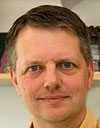
Dave Darmofal
received Murman Award for undergrad advising
|

2. Awards convocation honors AAers
AeroAstroers received their share of (deserved!) awards at the Institute's recent 2011 Awards Convocation:
- Professor Dave Darmofal — Earll M. Murman Award for Excellence in Undergraduate Advising
- Vicky Thomas — Frederick Gardiner Fassett Jr. Award for spirit, dedication, and service in furthering the ideals of MIT fraternity brotherhood and sisterhood.
- Ulric Ferner, Chelsea He, Amy Bilton— William L. Stewart Jr. Award for outstanding contributions to co-curricular activities and events
- Jose Marquez — Albert G. Hill Prize for minority undergraduate junior or senior student who has maintained high academic standards and made continued contributions to the improvement of the quality of life.
- Sigma Alpha Epsilon, including member Philip Hunt, received the D. Reid Weedon, Jr. '41 Award for Excellence in Alumni Relations
Well done, all! |
|

3. Team is #1 in Clean Energy transport category
The team "Made in the Commonwealth," led by grad student and Partnership for AiR Transportation Noise and Emissions researcher Matthew Pearlson, emerged first in the MIT Clean Energy Prize's transportation category. Students Jim Morrison and Philip Wolfe are also on the team. Based on Matthew's thesis research in PARTNER, the team hopes to produce renewable ultra-low sulphur fuels for jet aircraft, as well as gasoline, diesel, and natural gas for other vehicles, at a new refinery in the Boston area. They hope to raise $20 million this year to begin fuel production. Matthew reports that the team is in the second round of the Mass Challenge business plan, too. |
| |

4. The defenders
Congratulations to the following students who, since our last issue, have successfully defended their thesis:
• Mina Jun,
"Microphysical Modeling of Ultrafine Hydrocarbon-Containing Aerosols in Aircraft Emissions"
• Dan Courtney, "Ionic Liquid Ion Source Emitter Arrays Fabricated on Bulk Porous Substrates for Spacecraft Propulsion"
• BJ White, "Technology Survey and Performance Scaling for the Design of High Power Nuclear Electric Power and Propulsion Systems"
• Tatsuya Arai, "Estimation of Cardiovascular Indices by Analysis of the Arterial Blood Pressure Signal"
• Claire Cizaire, "Optimization Models for Joint Airline Pricing and Seat Inventory Control: Multiple Products, Multiple Periods"
• Jaime Mateus, "Photoplethysmography for Non-Invasive Measurement of Bone Hemodynamic Responses to Changes in External Pressure"
• Fabio Fachin, "3D MEMS via (Post-)Buckling of Micromachined Structures and Integration of Bulk Nanoporous Elements in Microfluidic Devices" |
| |

5. Class of '11 presents its awards
One of the most eagerly anticipated events of the season is the AA Senior Recognition Dinner, which was held May 9 at the Cambridge Marriott. At the dinner, the following awards were presented:
- The Andrew Morsa Prize: Michael Munoz, Jameson Nash, and Spencer Parra – For ingenuity in the design and development of a flexible and reliable avionics and communication system for the CASTOR satellite.
- The Yvnge Raustein Award: Kieran Mclaughlan – For his passion and dedication to Unified Engineering, his exceptional achievements, his remarkable resourcefulness in overcoming multiple challenges, and for his inspiration in responsible learning.
- The David J. Shapiro Memorial Award: Thomas W. Fronk, to travel to Amsterdam, Netherlands, to do research at the National Aerospace Laboratory on the Mature Unmanned Aircraft Ground Control Station project.
- The Apollo Award: Eric D. Peters for excellence in designing and building an ankle joint exoskeleton.
- The Leaders for Manufacturing Prize: Stephen Howland for the design of the ExoplanetSat structural model and for leading its fabrication and assembly, and Eric Peters for his leadership role in, and technical contributions to, the CASTOR team.
- The Lockheed Martin Prize for Excellence in Systems Engineering Teamwork: Rebecca Jensen-Clem and Joseph A. McCarter for demonstrating exceptional leadership and skill in the management of the ExoplanetSat nanosatellite student team, and for expertly representing the team when communicating with individuals from the aerospace industry and astronomy community.
- The United Technologies Corp. Prize: Maximilian Brand and Anjaney Kottapalli for outstanding work in the conception, design, and implementation of an experiment that demonstrates short-wave stall inception.
- The Admiral Luis De Florez Prize: Bruno Alvisio and Lucas de la Garza for the design and testing of an accurate, inexpensive, and easy-to-use device that assesses human workload by measuring blink rate.
- The James Means Award for Excellence in Flight Vehicle Engineering: Mark Thompson for his contributions and excellence in organizing and managing design-and-build student projects, including an aircraft-launched micro-UAV and a Design-Build-Fly competition aircraft.
- The AeroAstro Undergraduate Teaching Assistantship Award: Ian Sugel for excellence in serving as the senior undergraduate teaching assistant in 16.07, with significant responsibilities for conducting recitations, grading quizzes, leading class discussions, and constructing standard solutions for problem sets and quizzes.
- The AeroAstro Graduate Teaching Assistantship Award: Brandon Luders, for his tireless efforts in setting up the 16.30 new laboratories and the recitations, and for the significant positive impact that his efforts had on the student learning in the course, and Lei Qiao for his dedication and superior educational contributions in the form of novel and didactic course material in 16.90, as well as in 16.225J/2.099J.
- The Henry Webb Salisbury Award: Carla Perez Martinez, for superior and multiple-dimensional academic achievements in the Undergraduate Program, and Andrew Wang for superior and multiple-dimensional academic achievements in the undergraduate program.
- The Rene H. Miller Prize in Systems Engineering: The TERSAt leadership team for bringing together scientists and engineers to create exceptional systems engineering documents which have excelled in the University Nanosatellite Program. Team leaders Emily Calandrelli, Maria De Soria-Santacruz Pich, Carla Perez Martinez, and Jonathan Battat.
- The AIAA Undergraduate Advising Award: Prof. Ian Waitz
- The AIAA Undergraduate Teaching Award: Prof. Youssef Marzouk
|
|

6. AA profs teaching summer professional ed programs
This summer, MIT Professional Education – Short Programs is offering 2 to 5 day short courses taught by MIT faculty and experts. AeroAstro faculty teaching these courses are Debby Nightingale, Earll Murman, Annalisa Weigel, Oli de Weck, and Ed Crawley. To see the courses they're teaching, visit http://web.mit.edu/aeroastro/news/short-profed-2011.html For complete details on all of the available courses, visit the Short Programs website. |
|

7. Tech Communications comp highlights research
The recent Technical Communications Research Competition highlighted the best graduate student research in the department and encouraged students to hone their public speaking skills, reports GA^3 Student Involvement Chair Allie Anderson. Students who passed their thesis proposal defense were eligible. The competition consisted of two rounds of presentations. The first round had eight student participants. The top three were selected to present their work in the final round. Faculty and student judges determined which student deserved the top prize ($500) based on quality of research, accessibility for the greater AeroAstro community, and presentation skills. This is the first year this prestigious award was presented; it is expected to become an annual event.
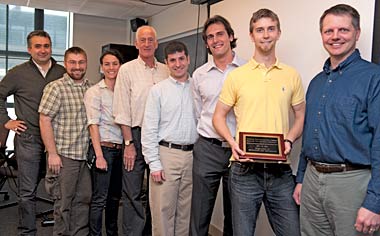
(From left) Professor Emilio Frazzoli, Alex Stimpson, Allie Anderson, Professor Jeff Hoffman, Andrew March, Fabio Fachin, David Butts, and Professor Dave Darmofal. Butts was the Tech Communications Research Comp winner, the professors and Anderson were judges, the others were finalists.
|
|

8. Seen around AeroAstro
16.83X Capstone Class students recently posed for the camera with their projects. Thanks to grad student Alessandra Babuscia for the details:
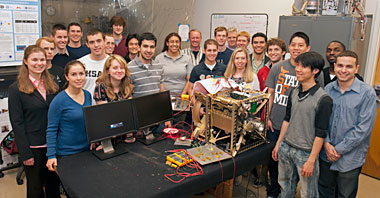
CASTOR (Cathode Anode Satellite Thruster for Orbital Repositioning) is a 50K ring-class satellite designed to test performance of the Diverging Cusped Field Thruster, which is an electric propulsion engine developed by AeroAstro's Space Propulsion Laboratory.
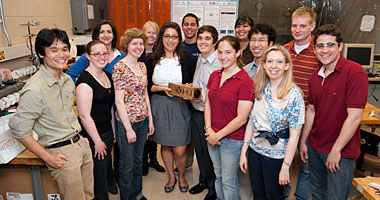
ExoplanetSat is a three unit cubesat equipped with an optical system to observe a star for one year, detecting any Earth-like planets that may be orbiting the star.
JUST PLANE WINNERS
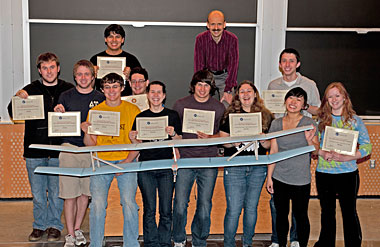
Professor Mark Drela hovers over the winners of this year's Unified Flight Competition: (from left) Brent Edelman, Daniel Rankin, Jed Storey, (rear) Luis Orrego, Samuel Range, Jennifer Quintana, (rear) Brian Coffee, Jin Stege, Fiona McCoy. The first place team members were Edelman, Rankin, Storey, and (not in photo) Steven Carreno.
|
| |

9. Newsnotes
Professor Moe Win was awarded the IEEE Kiyo Tomiyasu Award for fundamental contributions to high-speed reliable communications over optical and wireless channels." The award recognizes outstanding early to mid-career contributions to technologies holding the promise of innovative applications.
Professor Missy Cummings discusses the future of UAVS in the article "Drones are Ready for Takeoff: Will unmanned aerial vehicles—drones—soon take civilian passengers on pilotless flights?" appearing in the June 2011 issue of Smithsonian - just hitting the stands. She predicts that within ten years cargo planes will fly without human pilots and that passenger jets will ultimately follow.
Rachel Ellman, a bioastronautics PhD student, won second prize in the extremely competitive student poster contest at the 18th Humans in Space Symposium in Houston last month, reports Professor Larry Young. Her poster, "Partial Loading of Lunar or Martian Simulated Gravity is not Sufficient to Prevent Bone and Muscle Loss."
Grad student Dan Buckland has been named recipient of the Space Medicine Association Jeffery R Davis Scholarship. The scholarship encourages students, who have demonstrated academic achievement and shown an interest in Space Biology and Space Medical Operations, to pursue a career in space medicine.
Grad student Anton Aboukhalil, who is pursuing "biologically-oriented research" was one of about 550 students selected from more than 20,000 applicants to attend the 61st Meeting of Nobel Laureates, in Lindau, Germany focusing on Physiology & Medicine. This meeting is organized to allow grad students & post-docs from around the world to attend lectures by Nobel Laureates, and participate with them in panel discussions, exchange of ideas, conversations, and project discussions.
Professor Jon How and his former student, AeroAstro alum Han-Lim Choy's, (now an assistant professor at the Korea Advanced Institute of Science and Technology) paper "Continuous trajectory planning of mobile sensors for informative forecasting," has won an award for "Best Applications Paper Published in Automatica over the last three years." Automatica is a journal of the International Federation of Automatic Control.
AeroAstro students captured both first and second prizes in the XCOR Exploration Competition, held as part of the MIT 150 Celebration, to generate exciting ideas for future exploration. The $4000 grand prize was awarded to Mary Knapp '11, for her project, "SOLARA: Exploring the Last Frontier of the EM Spectrum." Second place went to graduate students Rachel Forman and Aaron Johnson, who received $2000; their project was titled "Lifelike Robotic Birds for Remote Exploration of the Amazon Rainforest."
As we go to press, we have learned that the MIT Rocket Team came in second of more than two dozen schools competing in NASA's University Student Launch Initiative. We hope to have more details in our next issue. |
 
|

Follow AeroAstro
Don't wait for your enews and emails — keep up with AeroAstro news as it happens — follow the department on Twitter and Facebook. |
|
If you know of events, honors, activities, or other information you'd like to see in the next issue of AeroAstro enews, please send to wlitant@mit.edu — we'd be pleased to include your submissions. |
|







